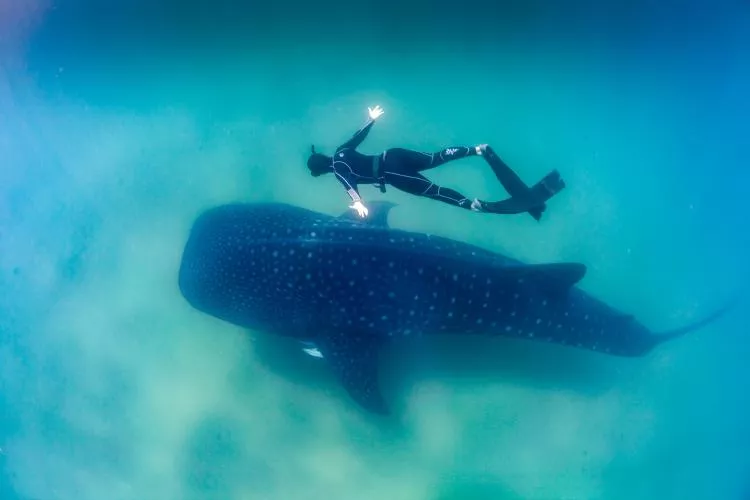Behavioural consequences of shark ecotourism
Shark ecotourism, a rapidly growing sector, offers both opportunities and challenges for marine conservation. Recent studies have delved into the multifaceted aspects of this industry, exploring its effects on shark behaviour, local economies, and conservation efforts.
Ecotourism, particularly shark diving tourism, has become a significant global industry, attracting over half a million participants annually across approximately 85 countries. While it generates substantial revenue and raises awareness for shark conservation, concerns about its impact on shark behaviour and health, as well as human safety, persist.
A study by researchers from Imperial College London involved capturing whale shark behaviour using UAVs both in isolation and during human interactions in La Paz Bay, Mexico. The team employed deep learning algorithms to analyze the movement patterns of these sharks, focusing on changes in behaviour due to the presence of humans.
Key Findings
The research revealed that human interaction increases the likelihood of whale sharks being in a disturbed behavioural state. This state is characterized by rapid, erratic movements, likely leading to increased energetic expenditure and potential downstream ecological effects. The study also found that behavioural responses to ecotourism are context-dependent, influenced by the sharks' initial behavioural state.
These findings raise concerns about the ecological impact of shark ecotourism, an industry aimed at conserving shark populations. The study suggests that ecotourism activities, even those without provisioning, can lead to behavioural disturbances in whale sharks, potentially affecting their foraging success and increasing the risk of injuries.
Research on Australia's marine World Heritage Sites, including Ningaloo Marine Park and Shark Bay Marine Park, employs the Marine Protected Area Governance framework to analyse governance effectiveness. This approach highlights the importance of balancing conservation objectives with tourism and local community needs.
Emotional engagement
Studies suggest that wildlife tourism, including shark-based tourism, can foster a conservation ethic among participants. However, the effectiveness of these efforts varies, depending on the species involved and the nature of the tourist experience. Emotional engagement with wildlife is key to fostering pro-conservation attitudes and behaviours.
The growth of shark-based tourism has shifted public perception of sharks, once seen as a threat to coastal tourism, to an important attraction. This change is crucial for the conservation of shark species, which face significant threats from global fisheries.
The relationship between shark ecotourism and conservation is complex. This study underscores the need for responsible ecotourism practices that minimize disturbance to marine life. While ecotourism has the potential to support conservation efforts, careful management and regulation are essential to ensure that tourism practices are sustainable and beneficial for both sharks and local communities.
As the industry continues to grow, understanding and mitigating its impact on the behaviour and ecology of whale sharks is crucial for the sustainability of both the ecotourism sector and the species it seeks to protect.
Ecotourism has been posited as a potential solution to many of the issues facing shark conservation, yet increasingly studies suggest that such activity may negatively influence aspects of shark ecology and so further pressure declining populations.
— Joel H. Gayford, et al.



























